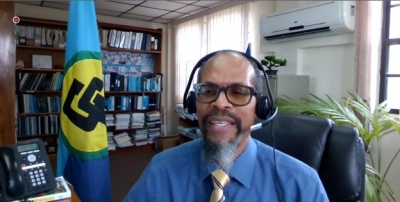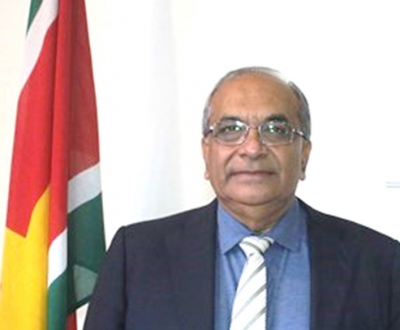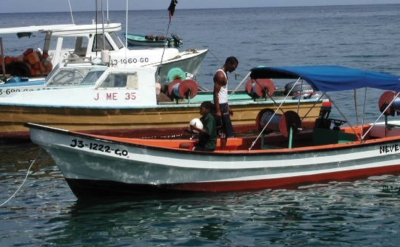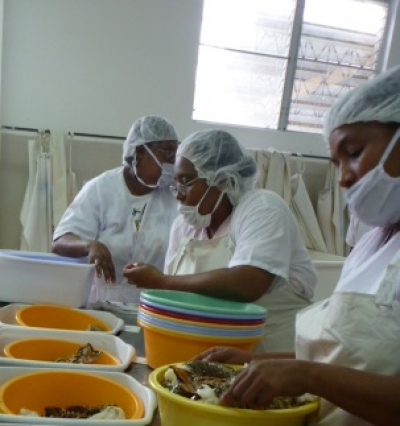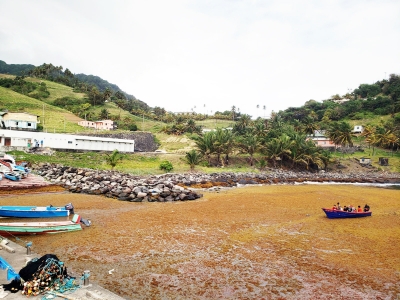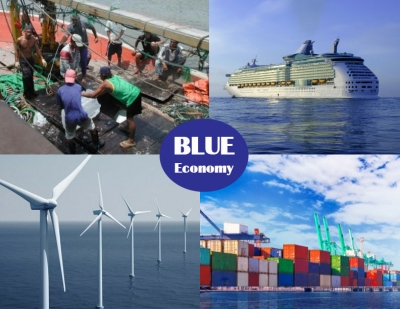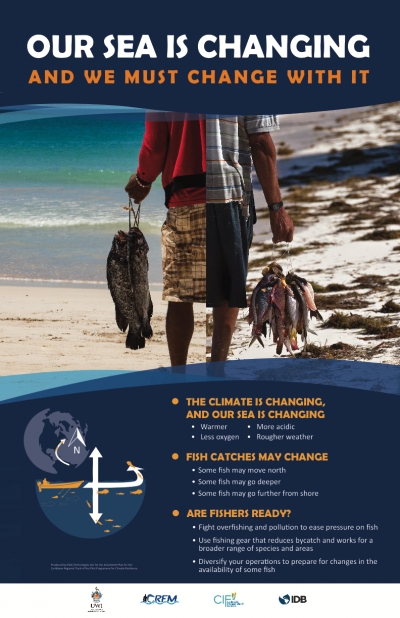Updated Caribbean Community Common Fisheries Policy
The Updated Caribbean Community Common Fisheries Policy (2024) was approved by the Ministerial Council of the Caribbean Regional Fisheries Mechanism at its Eighteenth Regular Meeting held Friday, 26 April 2024.
The Fourteenth Inter-sessional Meeting of the CARICOM Conference of Heads of Government, held in Trinidad and Tobago on 14 - 15 February 2003, mandated the elaboration of a Common Fisheries Policy and Regime for the Caribbean Community. Subsequently, on 20 May 2011, the Ministerial Council of the Caribbean Regional Fisheries Mechanism (CRFM) approved the Caribbean Community Common Fisheries Policy (CCCFP) during its Fourth Meeting held in St. Mary’s, Antigua and Barbuda. Support for the policy was granted by the Seventy-first Special Meeting of the Council for Trade and Economic Development (COTED) – Agriculture, held at Georgetown, Guyana, which designated the Caribbean Regional Fisheries Mechanism as the Competent Agency for the CCCFP.
This version of the CCCFP contains the 23 original articles and four protocols approved by the Ministerial Council and COTED:
- The Protocol on Securing Sustainable Small-Scale Fisheries as the First Protocol under the Caribbean Community Common Fisheries Policy;
- The Protocol on Climate Change and Disaster Risk Management in Fisheries and Aquaculture under the Caribbean Community Common Fisheries Policy with the changes proposed by the Council;
- The Protocol on Aquatic Foods as a Strategic Resource for Food and Nutrition Security under the Caribbean Community Common Fisheries Policy; and
- The Protocol under the Caribbean Community Common Fisheries Policy on the Principle of Sustainable Use of Marine Living Resources for Blue Economic Growth and Sustainable Development of CRFM Member States.
At its meeting in April 2024, the Council urged all organs of the CRFM and its Member States to continue their collective efforts, in collaboration with regional and international development partners, to advance the implementation of the CCCFP, as well as the development of any and all additional protocols necessary to attain its stated vision and purpose.
To access the document, click here.
CRFM and PFR of New Zealand developing innovative products from Sargassum

Greenhouse trial with liquid organic fertilizer derived from Sargassum (Photo: M. Haughton, CRFM)
Belize City, Thursday, 7 December 2023 (CRFM)—Groundbreaking work has begun in the Caribbean to produce Sargassum-derived liquid fertilizers or plant growth promoters, as well as an organic compost from processed Sargassum, for eventual incorporation into farmer and grower practices in the Caribbean. The Caribbean Regional Fisheries Mechanism (CRFM), an inter-governmental organization of the Caribbean Community (CARICOM), and Plant & Food Research, a New Zealand Crown Research Institute, are leading this initiative, under the Sargassum Products for Climate Resilience in the Caribbean Project, a multiyear project funded by the New Zealand Ministry of Foreign Affairs and Trade.
This builds on work undertaken by the CRFM since 2015, to address the persistent problem of recurring Sargassum inundations which have been plaguing the region for the past 12 years. Sargassum blooms continue to adversely affect the coastal ecosystems and economic sectors—such as fisheries and tourism—in many Caribbean countries, and clean-up efforts have been costly. Although Sargassum levels have fluctuated from year to year, the general forecast is for continued high levels of blooms and beaching of Sargassum in the foreseeable future. Climate change and nutrient enrichment of the oceans have been identified as major contributing factors to this phenomenon which has been affecting our region since 2011.

Sargassum inundation across a fishing beach on the island of Saint Lucia (Photo: M. Haughton, CRFM)
“Sargassum is a natural marine living resource that has been abundant in our coastal waters. It is often an unpleasant sight on our otherwise picturesque beaches, and rotting Sargassum heaps are hazardous to humans and marine life and environmental health. We must, therefore, find ways to use the Sargassum while neutralizing any potential negative effects of the heavy metals contained therein. The safe and profitable conversion of Sargassum biomass into innovative products to adapt to climate change and bolster economic resilience will also generate tangible economic and social benefits for local communities and present and future generations across the entire Caribbean,” said Milton Haughton, Executive Director of the CRFM.
The first phase of the project, which focused on testing the Sargassum to better understand how to handle and use it safely, was completed in 2022. This second phase, which commenced early 2023, focuses on product and process development. In May 2023, the CRFM concluded agreements with the University of the West Indies (UWI), Department of Biological and Chemical Sciences, Cave Hill Campus, and the Caribbean Agricultural Research and Development Institute (CARDI), which are providing technical support for joint research and surveys to advance the second phase of the project. During this phase, the project will develop and evaluate liquid fertilizers and compost from Sargassum. The hope is that this initiative will help to protect the marine environment and coastal communities, and create jobs and value-added products, while contributing towards the reduction of the region’s high import bill for fertilizers used by farmers.
There are two very important guiding principles of this project. The first is the application of the precautionary principle which ensures that when there is uncertainty and a risk of harm, we should act with care and caution, guided by the best available scientific information. The second principle encompasses the circular economy approach, which ensures total utilization of the Sargassum to eliminate waste and pollution, which is good for people, business, and the environment. The Sargassum harvested from the sea will, therefore, be used to produce fertilizer, and the residue will be utilized to generate other products such as compost and building materials—all of which will be safe and effective for their intended purposes.
UWI has assisted with the process of producing liquid fertilizers from the Sargassum. CARDI has been conducting a survey of farmers to engender a deeper understanding of how they use fertilizers and their interest in a fertilizer product from Sargassum. This knowledge will enhance strategies to promote the uptake of the Sargassum-derived products for use in the agriculture sector.
CARDI is now completing a study to evaluate the performance of the liquid fertilizers developed with the assistance of UWI on crops under greenhouse conditions. Further studies will be conducted in the field with the assistance of farmers.
Since the commencement of the Sargassum Products for Climate Resilience Project in 2020, the CRFM and Plant & Food Research of New Zealand have worked with partners in Barbados, Belize, Jamaica, and the Dominican Republic, and with specialized laboratories in the United States and New Zealand, to conduct Sargassum raw material safety testing and to review potential products that could be made from the Sargassum.
The final phase of the project, which is due to commence in 2024, will focus on the establishment of a pilot plant to produce liquid organic fertilizer, as well as on outreach and supply chain development, which would entail the dissemination of a workable model to industry stakeholders in the Caribbean. Through continued stakeholder engagement, the project will also gather feedback to guide future work, strengthen relationships with Caribbean enterprises, and develop sustainable pathways for the commercialisation of new Sargassum products.
– ENDS –
RESOURCES:
- Project Brochure: https://www.crfm.net/images/Sargassum_Products_for_Climate_Change_in_the_Caribbean_14Oct20.pdf
- Explainer Video:https://youtu.be/vLqR08DYkO0
In case you missed it, here is the recording of our recent seminar on Sargassum Value Chain Development.
Caribbean Sargassum project to develop innovative products for climate resilience advances to new phase
Belize City, Tuesday, 21 February 2023 (CRFM)—Sargassum seaweed influxes have been a bane to the Caribbean since 2011, but the Caribbean Regional Fisheries Mechanism (CRFM) and Plant & Food Research (PFR), a New Zealand government-owned Crown Research Institute, are advancing a regional project aimed at turning Sargassum into innovative products that will create jobs and income as well as contribute to building the region’s climate resilience and mitigating the negative impacts of Sargassum in the region. During 2023, the CRFM and Plant & Food Research —in partnership with other public and private sector institutions in the Caribbean region—will focus on lab-scale work and field trials to develop suitable prototype products from the Sargassum seaweed for commercial use.
A team from the CRFM Secretariat and Plant & Food Research recently visited Trinidad and Tobago and Barbados to meet with key stakeholders as they advance the second phase of the project titled, Developing Sargassum Products for Climate Resilience in the Caribbean.
Milton Haughton, Executive Director of the CRFM said: “Sargassum remains a major problem for our countries, coastal communities, and business enterprises, especially those in the fisheries and tourism sectors operating in the coastal and marine environment. We had a very productive mission to Barbados and Trinidad and Tobago meeting with partners and stakeholders with an interest in creating value-added products from the Sargassum. We are very confident that we can work together with interested partners to develop viable products and generate jobs and income streams for our people from this natural resource (Sargassum) that has been inundating our waters and beaches over the past 12 years. Our focus now is on developing and testing these prototype products and processes using the Sargassum. We will also be developing a product commercialization strategy.”

CRFM Executive Director, Mr. Milton Haughton (right),
Rosie Paterson-Lima, International Development Program Manager at Plant & Food Research (center),
and Beverley Sutherland, Project Coordinator (left)
Rosie Paterson-Lima, International Development Program Manager at Plant & Food Research, said her organisation’s involvement was made possible by funding from the New Zealand Government International Development Cooperation Programme.
“It is exciting for us to work in partnership in the region on this challenge, and to bring our expertise in agronomy, value chain analysis, and commercialisation. Together our goal is to minimise the problems caused by Sargassum by creating viable economic opportunities for the region. We are delighted to have Barbadian Dr Terrell Thompson joining the project delivery team recently as a consultant. Dr Thompson is a chemicals and materials engineer with impressive expertise and experience in the Sargassum industry,” Paterson-Lima said.
The mission spanned 30 January to 11 February 2023. In Trinidad and Tobago, the team met representatives of the Caribbean Agricultural Research and Development Institute (CARDI), the Caribbean Public Health Agency (CARPHA), the Caribbean Industrial Research Institute (CARIRI), the Engineering Faculty of the University of the West Indies, the Association of Caribbean States, the Caribbean Private Sector Organisation (CPSO), and representatives of the Government of Trinidad and Tobago. In Barbados, the parties met with officials of the Ministry of Agriculture, Fisheries Division, and the National Conservation Commission of the Government of Barbados, UWI - Cave Hill Campus, the European Union, CARDI, UNDP, FAO, the Fisherfolk Organisations and the Samuel Jackman Prescod Institute of Technology. The purpose of these engagements was to share information on the Project and to explore opportunities for collaboration and strengthened partnerships under the project.
The CRFM and Plant & Food Research have successfully completed the first phase of the project, during which they worked with partners in Barbados, Belize, Jamaica, and the Dominican Republic to conduct Sargassum raw material safety testing and review of potential products that could be made from the Sargassum. They are embarking now on the second phase of the project, which is Product and Process Development.

Fishers in Barbados are among stakeholders who have been adversely affected by the Sargassum influxes
Sargassum blooms in the Atlantic have already begun, and they are expected to inundate the Caribbean region by April 2023. The Outlook of 2023 Sargassum blooms in the Caribbean Sea and Gulf of Mexico, released by the University of South Florida Optical Oceanography Lab on 1 February 2023, revealed that, “The overall Sargassum quantity in the Atlantic Ocean doubled from December 2022 to January 2023 (8.7 million tons), again setting a new record (previous January record was 6.5 million tons in 2018).” The outlook noted that this is the second consecutive monthly doubling of Sargassum, previously observed only in 2018, and all indications are that the Sargassum biomass will continue to accumulate and migrate westward over the next several months. Climate change has been identified as one of the major contributing factors to this phenomenon which has been affecting our region—and principally our coastal fishing communities—for the past 12 years.

Sargassum inundation defaces coastline of Saint Lucia fishing community (June 2022)
The CRFM-Plant & Food Research collaboration will identify and use appropriate sustainable technologies for efficient harvesting of Sargassum, according to international best practices. The final phase is outreach and supply chain development, which would entail the dissemination of a model to industry stakeholders and wider Caribbean.
– ENDS –
RESOURCES:
Financing, technology and empowering coastal communities are key to addressing climate change threats to Caribbean's Fisheries: CRFM Executive Director
"Climate change and ocean acidification pose significant threats to fish production on top of the many other pressures, such as overfishing, habitat degradation, pollution and invasive species—all undermining our food and nutrition security..."
-- Mr. Milton Haughton, CRFM Excecutive Director
Published Thursday, 4 August 2022 by the CRFM Secretariat
The Executive Director of the Caribbean Regional Fisheries Mechanism (CRFM), Mr. Milton Haughton, has underscored the need for access to financing and technology in addressing the threats which climate change pose to Caribbean fisheries and aquaculture. In addressing the Latin America and the Caribbean Climate Week 2022 (LACCW) side event in July on Anticipating climate risks and preventing disaster: climate resilient development pathways in Latin America and the Caribbean, he emphasized the need to build partnerships as well as capacity at the local and community levels. He also spoke of the need to pursue an integrated approach to implementing and mainstreaming the best practices developed over the years to improve resilience and empower coastal communities.
Mr. Haughton expressed concern that adverse climate change impacts will inevitably result in reduced availability of fish for local consumption and export—compounding the threats that already confront the fisheries and aquaculture sector.
"Climate change and ocean acidification pose significant threats to fish production on top of the many other pressures, such as overfishing, habitat degradation, pollution and invasive species—all undermining our food and nutrition security," he stated.
The CRFM Executive Director also stressed the need for CRFM Member States to take the whole-of-government approach, rather than a siloed approach to combating these myriad challenges and threats arising from climate change. The Caribbean Community (CARICOM) has placed a high priority on supporting climate change adaptation and mitigation, as well as disaster risk management across the Community. In this regard, in 2005, the CARICOM Heads of Government established the Caribbean Community Climate Change Centre (CCCCC). The CRFM maintains a close partnership with the CCCCC as well as the Caribbean Disaster Emergency Management Agency (CDEMA), in addressing adaptation to climate change and disaster risk management in the fisheries sector. Furthermore, the CRFM works closely with several other key partners, including Member States, donors, local civil society and NGOs, to develop and implement best practices.
In 2018, the CRFM’s policy-makers, the Ministerial Council, adopted the Protocol on Climate Change Adaptation and Disaster Risk Management in Fisheries and Aquaculture, an important protocol to the Caribbean Community Common Fisheries Policy (CCCFP) which promotes cooperation and collaboration among Caribbean people, fishers and governments in conserving, managing, and sustainably using fisheries and related ecosystems, as well as improving the welfare and livelihood of fisherfolk in the region. Another key instrument is the CRFM’s Regional Strategy and Action Plan for Climate Change Adaptation and Disaster Risk Management in Fisheries and Aquaculture (2020-2030) .
Mr. Haughton noted that at the national level, several CRFM Member States have developed climate change policies and strategies, providing a roadmap at the national level to address the problems arising from climate change.

Fisherfolk in Saint Vincent and the Grenadines received equipment obtained through the CRFM Secretariat under the CIF/IDB Pilot Program for Climate Resilience - Caribbean Regional Track.
He also highlighted several projects that the CRFM has been involved with, which address the issue of climate change. These include the Climate Change Adaptation in the Eastern Caribbean Fisheries Sector Project (CC4FISH) and the Caribbean Fisheries Co-management Project (CARIFICO), which promoted the development and deployment of Fish Aggregating Devices (FADs) capable of withstanding category 5 hurricanes, thereby reducing damaging impacts to the environment, including ghost fishing.
The CRFM was also integrally involved in the IDB Pilot Program for Climate Resilience (PPCR) - Caribbean Regional Track, which was funded by the Climate Investment Fund (CIF). The CRFM Secretariat coordinated the marine sub-component of the Regional Project, which was executed by the Mona Office for Research and Innovation (MORI) at the University of West Indies, Jamaica. The CRFM coordinated the development and testing of the Fisher Early Warning and Emergency Response (FEWER) Moobile App in collaboration with UWI. The CRFM is partnering with CDEMA, in an effort to expand the reach and uptake of this tool and scale up its benefits across the region.
The CRFM’s collaborative work has extended to the mainstreaming of the Caribbean Catastrophe Risk Insurance Facility (CCRIF)—a very important parametric insurance arrangement to help counter the impacts of adverse weather events and other natural disasters affecting the fisheries sector—and the roll-out of the Caribbean Ocean and Aquaculture Sustainability Facility (COAST)–an innovative climate risk insurance mechanism to promote food security; livelihoods of fisherfolk; resilient fisheries; sustainable management of coastal infrastructure; and disaster risk reduction in the Caribbean.
The CRFM has also supported the expansion of the Caribbean’s Coral Reef Early Warning System (CREWS) Network , through which stations have been installed in some Caribbean countries with support from the CCCCC.
The most recent initiative of the CRFM is being implemented in partnership with the Government of New Zealand through Plant and Food Research Limited. The Sargassum Products for Climate Resilience Project seeks to turn the large swaths of Sargassum seaweed that have been inundating Caribbean beaches and coastal waters annually since 2011, into commercially viable products that would provide new opportunities for enterprise, livelihoods, employment and economic growth.
To access the body of CRFM documentation on climate change adaptation and disaster risk management, visit the CRFM Portal . You can also register to become a member of the portal.
#CaribbeanFisheries #climatechange #LACCW #CRFM
© 2022 Caribbean Regional Fisheries Mechanism
CRFM Ministerial Council positions fisheries and aquaculture to help reduce Caribbean’s food import bill by 25% by 2025
Belize City, Monday, 25 April 2022 (CRFM)—Fisheries Ministers from countries that comprise the Caribbean Regional Fisheries Mechanism (CRFM) met on Friday, 22 April 2022, at their 16th Regular Meeting, to advance the institution’s strategic actions to build resilience and boost sustainable fisheries and aquaculture production, through targeted initiatives aimed at maximizing sustainable blue economic growth and improving access to international markets, while tackling the scourge of illegal, unreported and unregulated fishing and transnational organized crime in the industry.
Ministers highlight importance of blue economic growth in reversing declines in fish production and exports resulting from the COVID-19 pandemic and in accelerating regional economic development
Before handing over the mantle of leadership to Suriname, the outgoing chair of the CRFM Ministerial Council, Hon. Saboto Ceasar, Minister of Agriculture, Rural Transformation, Forestry and Fisheries of Saint Vincent and the Grenadines, emphasized that whereas much had been achieved during the previous year, significant work remained to be done. He informed the meeting that at the 37th session of the FAO Regional Conference for Latin America and the Caribbean (LARC37) held in Ecuador in March 2022, the CRFM Member States reiterated the request to the UN Food and Agriculture Organization (FAO), for the deployment of the Norwegian Research Vessel (RV) Dr. Fridtjof Nansen, to conduct an independent marine resource survey of the marine living resources in the waters under the jurisdiction of CARICOM States. During this 16th Meeting of the Ministerial Council, the Ministers reiterated the crucial importance of moving ahead with the research, as it would provide an invaluable evidence base to drive informed blue economic development across the region, and expedite the region’s economic rebound and recovery from the adverse impacts of the COVID-19 pandemic on the fisheries and aquaculture sector, which is already beginning to show positive signs of revitalization with more fishers and vessels returning to sea. The Meeting also discussed other ongoing initiatives to strengthen capacity for evidence-based decision making, including the Iceland-funded CARICE Project and FAO/WECAFC-Fisheries Resources Monitoring System (FIRMS) partnership.
Hon. Parmanand Sewdien, Suriname’s Minister of Agriculture, Fisheries and Animal Husbandry, elected as the new chair of the CRFM Ministerial, presided over the deliberations. The Ministers received updates on several initiatives being implemented by the CRFM Secretariat and Member States in collaboration with regional and international development partners, in the context of the Third CRFM Strategic Plan, spanning 2022 to 2030. These include the US$48 million CAF-FAO-CRFM-GEF supported project on Promoting National Blue Economy Priorities through Marine Spatial Planning in the Caribbean Large Marine Ecosystem Plus project (BE-CLME+), which the CRFM hopes will commence later in 2022. The Ministers affirmed that this initiative could contribute greatly to the realization of the target set by the CARICOM Heads of Government at their meeting held during March 2022, to reduce the region’s overall food import bill of around US$5-6 billion by 25% by 2025.
Additionally, the Ministers discussed initiatives which the CRFM and its Member States are undertaking to address the Sargassum inundations that have been affecting the region, including efforts to explore opportunities, through a partnership with New Zealand, to safely harvest Sargassum for the development of products that would enhance the region’s economic and climate resilience. This is being pursued under a three-year project, spanning 2021 to 2023, funded by the New Zealand Ministry of Foreign Affairs and Trade (MFAT) and implemented jointly by the New Zealand Institute for Plant and Food Research Limited (PFR) and the CRFM.
The Ministers also dealt with the vital need for strengthening the region’s access to international markets, through enhancing fish and seafood quality and safety, with enhanced sanitary and phytosanitary (SPS) measures. The CRFM Secretariat and the Inter-American Institute for Cooperation on Agriculture (IICA), through the 11th European Development Fund SPS Project, continue to work with Member States and the private sector to build their trading capacity, thereby also contributing to the wider goal of slashing the region’s import bill over the next three years. They also considered the progress of the ongoing negotiations at the World Trade Organisation to prohibit the provision of certain fisheries subsidies that contribute to illegal, unreported and unregulated (or IUU) fishing and overfishing.
The Ministerial Council gave the greenlight for the CRFM Secretariat to work with development partners to facilitate knowledge and technology transfer for integrated multitrophic aquaculture—which enables cost-effective and environmentally friendly expansion of aquaculture, including mariculture. The Ministers also welcomed positive news on the progress of activities under the Japan-funded COASTFISH project, which builds upon a previous Japan-funded co-management project in the region, which has strengthened the conservation, management and sustainable use of coastal marine resources through greater involvement of fishers and coastal communities.
The United Nations has declared 2022 as the International Year of Artisanal Fisheries and Aquaculture (IYAFA), to celebrate and improve awareness of the significant role of small-scale fishers. In welcoming the IYAFA celebrations, the Ministers reaffirmed the importance of the small-scale fisheries and aquaculture for employment, livelihoods, food security and nutrition, and health and wellbeing of the people of the region and acknowledged the CRFM’s preparation of a series of activities, including a high-level policy dialogue with fishers to mainstream small-scale fisheries and aquaculture in the ongoing blue economy dialogue.
|
Hon. Avinash Singh, represented the Ministry of Agriculture, |
Trinidad and Tobago, represented by Minister in the Ministry of Agriculture, Land and Fisheries – Senator the Honourable Avinash Singh, was elected as vice chair at the meeting and is, therefore, next in line to assume the chair of the CRFM Ministerial Council in 2023, when the CRFM will commemorate the 20th anniversary since its launch with a series of activities that the Ministers approved during this 16th Meeting of the Council.
The CRFM Executive Director, Milton Haughton, said that this was a very productive meeting. He noted that the Ministers recognized the urgency of addressing the challenges facing the sector and made several decisions that will contribute to a more sustainable, resilient, and productive fisheries and aquaculture sector and ultimately to improved national and regional economic growth, food security and nutrition, livelihoods and well-being of the people of the region.
- Ends -
Fisheries Ministers seek new strategic direction during 11th Special Meeting of the CRFM Ministerial Council
Belize City, Saturday, 2 October 2021 (CRFM)—Ministers responsible for Fisheries from Member States of the Caribbean Regional Fisheries Mechanism (CRFM) are scheduled to meet on Monday, 4 October 2021, during the 16th observance of the Caribbean Week of Agriculture. The purpose of the meeting is to discuss the new strategic direction for the fisheries and aquaculture sector, which produced fish with an estimated ex-vessel value of US$480 million in 2020, despite the economic devastation caused by the COVID-19 pandemic.
The CRFM, an institution of the Caribbean Community (CARICOM), will convene the meeting to advance a new strategic 9-year direction for the organization, which also considers the emerging realities being brought on by the COVID-19 pandemic, as well as the growing challenges facing the sector due to climate change and its adverse impacts.
Ministers from CRFM Member States will be asked to approve the Third CRFM Strategic Plan for the period January 2022 to December 2030, as well as the complementary CRFM Resource Mobilization Strategy, which takes on a results-based approach to mobilizing much needed resources for the organization and its 17 Member States and partner organisations in the region.

Caribbean processing facilities aim to achieve international standards (Photo: CRFM)
The CRFM’s Plan addresses improved evidence-based decision making, conservation and management of the fisheries and protection of marine ecosystems, climate change and disaster risk management, and the expansion of sustainable aquaculture, including mariculture. It also promotes programmes aimed at improving the welfare and socio-economic situation of fishers and fishing communities in the region, by focusing on value addition and wealth creation, capacity building, use of technology, entrepreneurship, partnership ventures with private and public sector parties, and strengthening application of good governance principles, such as equity and equality, inclusiveness, and accountability.
Furthermore, the Ministers will be asked to review and approve a policy document supporting the drafting and approval of the Model Fisheries Legislation on Sanitary and Phytosanitary (SPS) Measures. The Draft Model Aquatic Animal Health Bill and the Draft Model Aquatic Food Safety Regulations, developed under the EU-funded 10th Economic Development Fund (EDF) Programme, are aimed at assuring safety and quality of fish and seafood available for domestic as well as export markets, in line with international standards, while maximizing economic gains for the sector.
Caribbean Fisheries Forum convenes its 19th Meeting
Belize City, Tuesday, 27 April 2021 (CRFM)—The Caribbean Fisheries Forum, the technical and advisory arm of the Caribbean Regional Fisheries Mechanism (CRFM), is convening its 19th Meeting this week. High on the agenda are updates on the status and trends in the fisheries and aquaculture sector; Coronavirus impacts and post COVID-19 reorientation of the fisheries sector; the sustainable management and use of fisheries resources; as well as matters related to the Sargassum seaweed, blue economic growth, climate change and fisheries, mainstreaming gender issues in fisheries, and the sustainable development of aquaculture.
Representatives from 17 Member States of the CRFM, as well as Observer entities are expected to attend and participate when the meeting convenes on 27 and 28 April 2021. The participants will also be engaged in plenary sessions on policy development, collaboration with other bodies, as well as broader issues of international significance, such as the World Trade Organization Fisheries Subsidies Negotiation, the UN Agreement on the Marine Biodiversity of Areas Beyond National Jurisdiction (BBNJ), and combatting international fisheries crimes.
For the past year, Saint Lucia has served as Chair of the Caribbean Fisheries Forum. At the upcoming meeting, Members are expected to elect a new chair and vice chair of the Forum, and determine the new composition of the Executive Committee of the Forum.
The Forum is also expected to formulate a set of recommendations for action by the CRFM Ministerial Council, due to meet in May 2021.
Sargassum Products for Climate Resilience in the Caribbean
In September 2020, the CRFM entered into a 3-year collaborative agreement with Plant & Food Research, to address Sargassum seaweed influxes in affected Caribbean countries. Plant & Food Research, a New Zealand Crown Research Institute, and the CRFM, an inter-governmental organization which promotes and facilitates the responsible utilization of the Caribbean's fisheries and other aquatic resources, are collaborating to explore the creation of new technologies and value chains from marine biomass, particularly the Sargassum seaweed.
The overall aim of the project is to mitigate the environmental and economic impacts of Sargassum seaweed influxes in affected Caribbean countries through the creation of inclusive value chains for Sargassum seaweed.
The CRFM has produced a leaflet with further details. View it online below or download a PDF copy HERE.
New GEF-Funded Multi-country Blue Economy Initiative Gets Underway in the Caribbean
BELIZE CITY, 4 MARCH 2020 (CRFM)—A new US$46 million initiative to promote Blue Economic priorities in the Caribbean, in support of the sustainable use and conservation of the region’s vast and diverse marine ecosystems and resources, gets underway with a two-day inception workshop on 5-6 March at the Best Western Plus Belize Biltmore Plaza Hotel in Belize City.
Marine ecosystems account for over 80 percent of CARICOM States and territories, supporting not just fisheries, but also tourism, ocean transportation, energy, and other economic pillars. They are also critical to the sustainable livelihoods of coastal communities and food security for markets even beyond their borders. Despite threats that confront the region—not the least of which are climate change, ocean acidification, marine pollution and irresponsible fishing—the Blue Economy model still holds great promise.
The current initiative, entitled “Blue Economy (BE): Caribbean Large Marine Ecosystem Plus (CLME+): Promoting National Blue Economy Priorities through Marine Spatial Planning in the Caribbean Large Marine Ecosystem Plus,” is a 4-year project funded by the Global Environment Facility (GEF) with a grant of US$6.2 million and co-financing of US$40.1 million. The Development Bank of Latin America (CAF) will be the lead implementing agency while FAO will be a co-implementing agency. The Caribbean Regional Fisheries Mechanism (CRFM) will be the project executing agency. The GEF-funded “BE-CLME+ Project” will promote blue economy development in the Caribbean region through marine spatial planning and marine protected areas, the ecosystem approach to fisheries, and development of sustainable fisheries value chains.
The expected results of the project include focused climate-smart investments into national and regional marine spatial planning (MSP) efforts that inform development and implementation of national blue economy strategies. The multi-country project will also focus on extending or strengthening marine protected areas to preserve marine ecosystems and ensure sustainable livelihoods to coastal and fishery communities. The project is also expected to result in the establishment of a regional MSP for ecosystem-based fisheries, inclusive sustainable fisheries value chains, and new or expanded marine protected areas in at least five Caribbean countries. It will also support improvements in knowledge management, monitoring and evaluation, based upon knowledge and experiences from the project and experiences with climate-resilient blue economies from other regions and other Global Environment Facility (GEF) International Waters projects, in partnership with IW: LEARN (the GEF’s International Waters Learning Exchange and Resource Network).
The Inception Workshop, to be held on 5-6 March, will be attended by representatives of the six participating countries: Barbados, Belize, Guyana, Jamaica, Panama and Saint Lucia, as well as partner agencies, including the Food and Agriculture Organization of the United Nations and the Development Bank of Latin America, SICA/OSPESCA, UWI-CERMES, JICA, UNDP-GEF CLME+ Project and the Caribbean Network of Fisherfolk Organisation (CNFO). Officials from the CRFM, CAF, FAO/WECAFC and the Belize Ministry of Fisheries, Forestry, the Environment and Sustainable Development will address participants at the opening ceremony, to be convened at 9:00 a.m. on 5 March.
It is expected that at the conclusion of the workshop, the participating States and partners will have agreed on the main activities, milestones and timeline to develop the detailed project document and workplan for submission to the GEF for consideration by November 2020.
Climate Change Project: PPCR - Caribbean Regional Track - Marine Sub-Component
Several information and knowledge products have been generated by the CRFM coordinated marine sub-component of the IDB-funded Pilot Program for Climate Resilience - Caribbean Regional Track that is being generally managed by the Mona Office of Research and Innovation (UWI, Mona).
These products give key messages to fishers, fisheries managers, vendors and consumers on the impacts of climate change on life below water, and ways to adapt.
Download the posters listed below. Check out the video playlists on CRFM's youtube channel, titled 'Working for Climate resilience' (posted here also for convenience).
And check out CRFM's latest Research Paper Collection Volume 9 that gives the most up to date details of the technical studies revealing expected climate change impacts on the marine capture fisheries sector.




